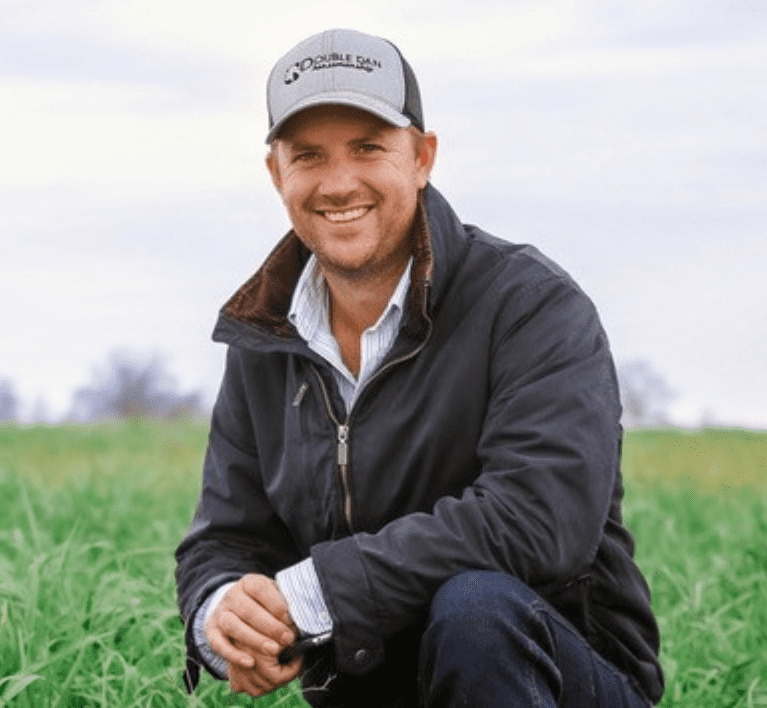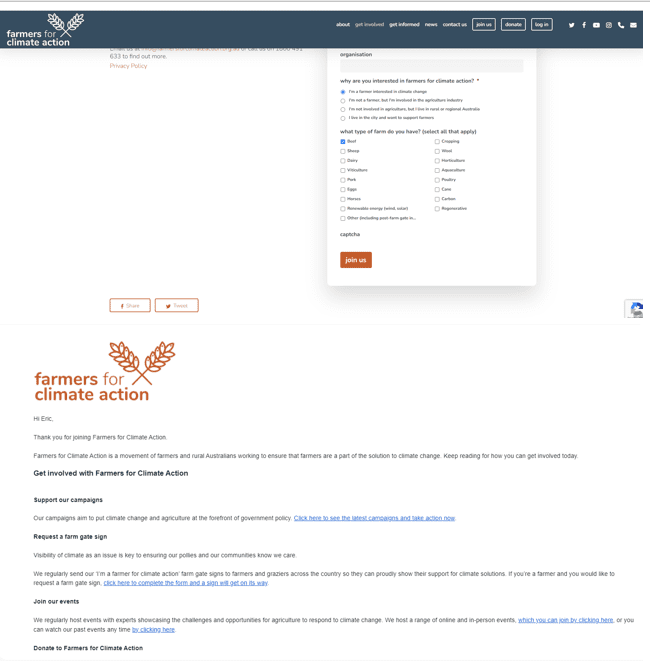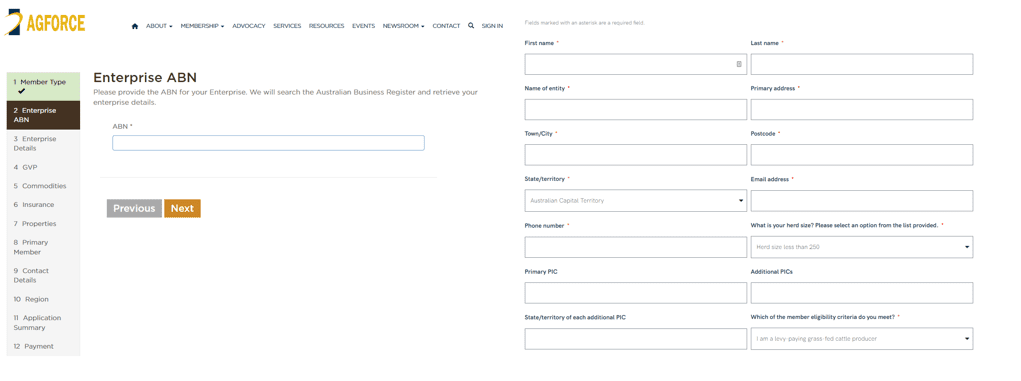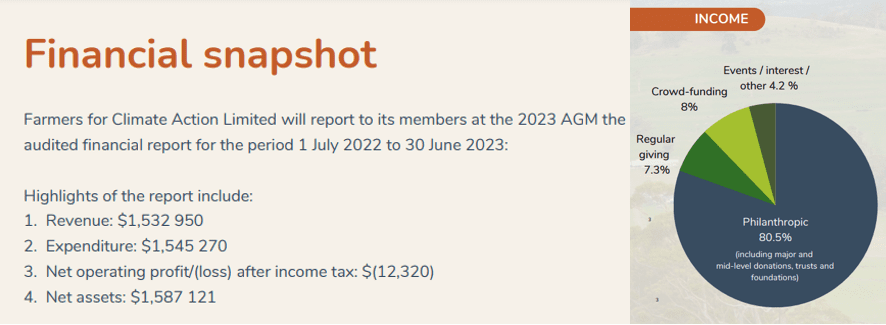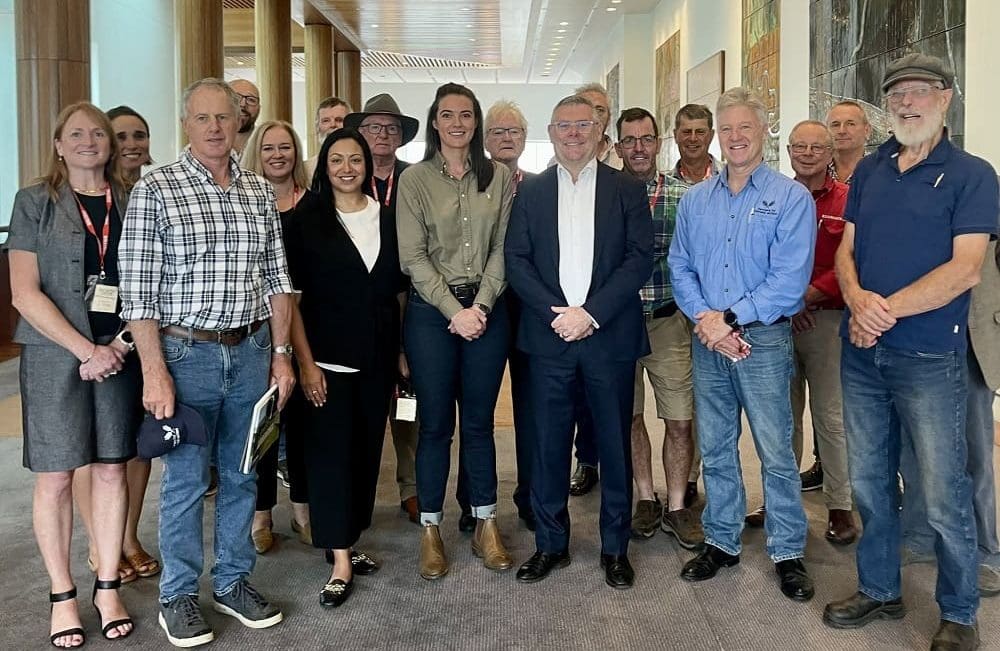
Agriculture Minister Murray Watt meeting with Farmers for Climate Action in Canberra. Photo: Twitter/X
WHO should have the power to speak on behalf of Australian farmers in the corridors of Canberra?
The question was sparked by social media posts this week in which the Federal Minister for Agriculture posted a picture of himself meeting with, and endorsing the work of, the Farmers for Climate Action group.
The Tweet received dozens of comments from primary producers, questioning whether FCA had the right to represent farmers – with no legislated role, no financial commitment from the producers it is claiming to represent and no validation process to back up its claim of representing more than 8000 farmers.
The concerns have caused FCA to defend its membership model, arguing it has removed the financial burden of representation, allowing more farmers to join and showing a different way of operating to the established groups who have a yearly struggle to keep up memberships.
Its approach appears to have been so successful that FCA now has a direct line to the agriculture minister and a genuine seat at the table in forming agricultural policy – according to Murray Watt’s tweet.
Today I met with sheep, cattle, grain & horticulture farmers from around Australia who support renewable energy developments & the new income streams they are producing for rural Australia. pic.twitter.com/PgQQNTNkOQ
— Senator Murray Watt (@MurrayWatt) February 5, 2024
Central Queensland cattle producer Adam Coffey, who has a large following on Twitter/X, has been among a large number of social media users responding to Minister Watt’s post, and questioning whether legislated peak industry councils are receiving the same attention as “quasi” farming groups with no financial members.
Mr Coffey is a director of the legislated peak industry body Cattle Australia, but says he was posting in his own personal capacity as a producer, not in any way on behalf of the representative body
Contacted by Beef Central this week, Mr Coffey said he was concerned about the numbers of farmers FCA has been claiming to represent and the prominence its claimed membership was giving the organisation in important discussions about the future of farming.
“This is starting to undermine the process of how producers gain representation, state farming organisations have been around for a long time and our peak bodies are part of a legislative framework,” he said.
“There is a question mark over the minister here about who gets priority and who has a seat at the table for what are some pretty serious discussions about the future of agriculture.
FCA’s main cause is not Mr Coffey’s issue with the organisation, as he and his wife Jacynta have become well-known for their focus on environmental sustainability and are involved with several programs targeted at limiting climate change, including soil carbon and silvopasture projects on their property and participation in Government and industry programs.
“I am all for people having their say and don’t have any issues with the existence of groups like FCA,” he said.
“But I am questioning the validity of their seat at the table, because they have no financial members, no verification process as to whether their members are primary producers or levy payers and it is really unclear where their funding comes from.”
Should FCA have a seat at the table?
The questions Beef Central has been asking is not whether groups such as FCA have a right to exist and to voice their opinion on agricultural issues.
Nor is the question about whether the rural sector needs well-developed and clearly articulated climate policy.
Rather, the question is more specifically whether such groups have the mandate through transparent and significant memberships of farmers to influence policy on behalf of farmers nationally and to speak on behalf of farmers.
The traditional pathway for the rural sector to develop policy on behalf of farmers, to voice its positions on issues to Government and for Ministers to engage with specific agricultural industries has been through legislated peak councils and state farm organisations – in the grassfed cattle industry’s case that is Cattle Australia.
The groups can opt to be members of the national representative body, the National Farmers Federation, and have historically chosen to do so.
While FCA has pointed to the struggles of traditional groups to keep up memberships, an organisation like Cattle Australia has a legislated role to develop national policy on behalf of, and represent levy-paying grass-fed producers, whether they are paid members of Cattle Australia or not.
Who does Farmers for Climate Action represent?
FCA has had a meteoric rise since it was formed, in 2015, by a group of farmers stating they were disgruntled with the traditional groups dragging their heels on climate action.
The organisation has been extremely successful in getting its message to the media, putting out emails that are widely circulated to journalists with farmers to comment on climate events and policy changes.
It makes journalists’ jobs easy, sending the farmers’ mobile numbers, photos and video if needed for quick same-day turnaround of stories – the established groups are simply not as available. It has gained the support for some prominent farmers across Australia, many of them happy to take part in marketing campaigns.
On its website, FCA says it represents more than 8000 farmers across Australia, and says it has 45,000 followers overall.
How does FCA validate its claim of representing more than 8000 ‘farmers’?
FCA, which is a registered charity and relies on donations to fund its activities, says it does not require supporters to pay a financial fee to become members.
A “join us” button on its website enables people to apply to be members of the organisation.
The process requires users to provide their name, email address and postcode.
They are given a further option to add a mobile phone number and organisation name if they wish.
It then asks ‘why you are interested in FCA’, inviting users to click one of four options:
- I’m a farmer interested in climate change
- I’m not a farmer, but I’m involved in the agriculture industry
- I’m not involved in agriculture, but I live in rural or regional Australia
- I live in the city and want to support farmers
Clicking the first option prompts a further question asking which commodity you produce.
In testing out this process the author of this article may have inadvertently become both a farming and non-farming member – in the space of about 30 seconds.
A similar test with Qld state farm organisation AgForce, left the author $672 short of becoming a non-farming but industry affiliated member and an ABN short of getting through to the next stage of the farming member application. Cattle Australia asked for a producer PIC and an ABN.
Beef Central this week asked FCA to outline the process for people to become members of the organisation, and to explain the checks that are in place to ensure the number of members they refer to as farmers are actually farmers.
While no specific process was highlighted in response, chief executive officer Natalie Collard said the organisation has a strong connection with its farmers.
“Farmers for Climate Action is proud to represent 8000 farmers from right across Australia who are clothing and feeding Australia and the world. We were created in 2016 by a group of 30 farmers who felt traditional farming groups were not representing them on issues around climate change. Our membership has grown from 30 farmers to what it is today, based on the work we do. Our Chair, Brett Hall, is a fourth-generation beef farmer and former Cattle Council board director. He is also one of our original founding farmers.
“As one example of the broad membership of Farmers for Climate Action, respondents to our recent farmer survey reflected the make up of commodities across states and territories, very closely aligning with the ABS agricultural commodities data from 2023. Beef farmers were the biggest cohort of farmers who filled out the survey, followed by sheep (meat and wool) and grains – a similar split to the latest ABS data. Farm sizes ranged from 1 ha to 430,000 ha, and the number of employees on-farm ranged from 0 to 420.
“We’re proud to offer memberships which are not tied to funding and demonstrate our value to farmers through results, although many of our farmers choose to make a financial contribution by choice. We connect very regularly with our farmers through local groups and events run by our farmers, emails, webinars, surveys, them ordering signs from us, training and other initiatives. We know our members are farmers because we deal with them regularly. Our team also connects with our farmer members directly and regularly to inform our work.”
Where is the funding coming from?
With no required financial commitment from producers, Mr Coffey said it was hard to put FCA on the same playing field as the established groups.
“Personally, we pay thousands of dollars every year to be part of Agforce and Cattle Australia, which a significant financial commitment for us to be part of a legislative framework for us to have our say,” he said.
“Where is the equity here, groups like FCA are fronting up to perform the same role, based on what?”
According to its 2022-23 financial report, FCA received $1.5m in donations – with 80.5pc coming from philanthropic donations, 7.3pc regular giving, 8pc crowd funding and 4.2pc from events/interest/other.
“$1.5m does not just waltz in the door every year, so who is it coming from?” Mr Coffey said.
One known funder of the organisation is the Myer Foundation, which has committed $345,000 over three years according to its annual report. The foundation was formed by the Myer family, who own the well-known department stores and have a significant agricultural holding, including Yulgilbar Pastoral.
FCA was asked who made up the rest of the $1.2m in philanthropic funding.
“We understand it’s been extremely difficult for some farm groups who charge membership fees to attract members, and membership is something all agriculture organisations grapple with,” she said.
“We’re funded mostly by philanthropic donations, from both farmer donors and from some of the best-known and most recognised charitable trusts in Australia. We can confirm beef farmers are our largest commodity represented membership and that we enjoy a good eye fillet.”
Who is setting the policy at FCA?
Mr Coffey said he also had concerns about who was making the decisions at FCA after a webinar it held about livestock methane last year.
Prior to the webinar, Mr Coffey said the organisation approached him and a prominent scientist to talk about their push for industry to use reporting metrics designed to represent the short-lived nature of livestock methane – a debate that is happening across the world.
“I have an email sitting here that said the webinar had over 300 attendees signed up and asking me to write some sentences for a bio. Then I received a call to say the higher-ups had knocked it on the head because they think you are going to try and give livestock methane a free pass,” he said.
The webinar ended up hosting Australian National University professor Mark Howden and University of Melbourne professor Richard Eckard, who were warning against “distracting debate” over methane policy and urging the industry to stick with the status quo on emissions accounting.
“That’s where I lost a bit of faith in this organisation, because I would have thought having a balanced conversation about the warming impact of emissions is pretty central to what this organisation is trying to do,” Mr Coffey said.
FCA said the decision to take the webinar in a different direction was not ideological. In response to questions about how it sets policy and priorities, Ms Collard said FCA has several methods.
“We consult with our members through surveys on issues and direct consultation, as well as research,” she said.
“As well as representing our members’ views, we also connect them directly to elected representatives. Farmers who’ve joined us are clearly indicating where they’d like to see impact, given our mission is deep emissions reductions across the economy.”
What influence does FCA have over Australian ag policy?
In a response to Mr Coffey’s tweet, agriculture minister Murray Watt said he regularly meets with agriculture groups – including 20 meetings with the National Farmers’ Federation over the past 12 months.
“It’s disappointing to see farmers turning on other farmers publicly. I reckon we do better as an industry when we build each other up, even when we have different perspectives on certain topics,” Mr Watt said.
“I meet regularly with countless ag groups, including with Adam and Cattle Australia. I welcome his sustainability efforts within his organisation and on his own property.”
Given the questions were not about “farmer vs farmer” and more directed at the validity of the membership FCA claims to represent – as their role is not legislated and its validation of farmers was not as rigorous as others, the minister was again asked if FCA should be given the same weight as groups like CA. This article will be updated with a response.
FCA is a member of the NFF and is involved in policy setting.
President David Jochinke said while he was not personally a member of FCA, he urged producers to be active in representative groups and the discussions they have. He said FCA had as much say in the NFF’s policy setting as any other member organisation.
“The NFF is a federation in the true sense of the word, we have to make sure we have as close to a consensus as possible before we start advocating for certain policies,” Mr Jochinke said.
“We always endeavour to get consensus, and that normally leads us to be in the centre of a lot of these debates – rather than outlying perspectives. It is about collecting all the ideas and then trying to work out how to get the best outcome for all farmers.
“We have really good access to the agriculture minister, although we don’t always agree on things, we are able to have our say with this government.”
- Update: after signing up for Farmers for Climate Action, the author of the article received a courtesy call from the organisation asking to learn more about the farm. The call was made after this article was published and the caller was asked if this was a routine process, a question they refused to answer.

